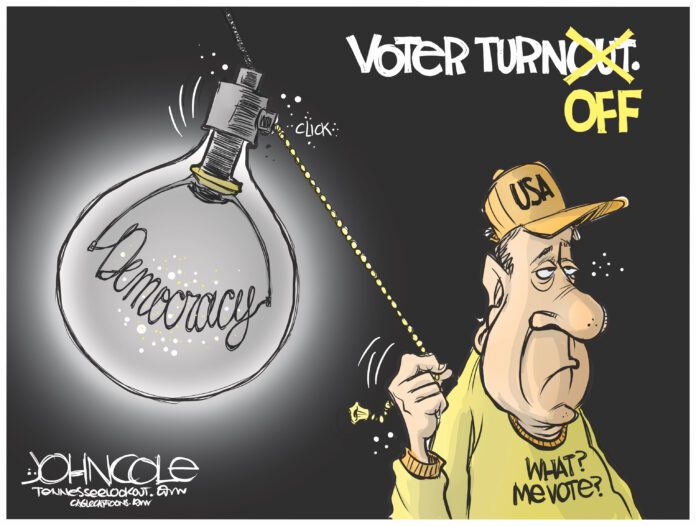As we enter the legislative session’s final frenzied weeks, let us pause briefly to consider the health of Oklahoma’s democracy.
I am not a physician nor have I played one on television. But it doesn’t require board certification to provide a diagnosis: The patient is ailing. Perhaps on the verge of life support.
You see, too many Sooners have checked out of the political system. As many as a quarter million age-eligible Oklahomans aren’t even registered to vote. Turnout for governor, U.S. Senate and other state elections rarely tops the low 50%-plus – just 50.3% in 2022. Presidential election turnouts typically are higher, yet hundreds of thousands typically sit them out.
Disheartening, yes. But that’s not the worst of it. Check out the number of candidate filings for 127 legislative seats up for grabs this year: Only 285 – fewest in a decade.
Think about that: More than one-third of state legislative seats – 50 of 149 – were filled without a single vote being cast. In addition, another 30 will be decided in June 18’s Republican and Democratic primaries.
Some hyper-partisans might portray it as a positive sign that Oklahoma voters, generally, are satisfied with their representation. That doesn’t pass the smell test.
Though I haven’t been privy to recent polls, it’s difficult to imagine a majority of Oklahomans is copacetic with a Legislature that prioritizes culture war issues over real problems like child hunger, access to health and mental health care, and the exodus of teachers from the classroom.
More likely, it’s a sign that would-be public servants are discouraged from even trying to win a seat because the game is rigged against challengers.
Legislative districts are gerrymandered to create and protect a Republican supermajority. Big Money flows to power – and to candidates and officeholders who toe the Big Money line. And in the social media age, reputations can be destroyed in a nanosecond.
Why would anyone in their right mind want to expose themselves – or their families – to that?
As if the powers-that-be at NE 23rd and Lincoln Blvd. don’t already hold most of the cards, they’ve been at work this session trying to make participation even harder for rank-and-file Oklahomans.
Still alive, for example, is a proposal that could make an already onerous initiative process all but impossible, demanding more i’s dotted and t’s crossed by signees and those collecting signatures, imposing a hefty petition filing fee and extending the period in which challengers can work their legal magic to try to keep an initiative off the ballot.
Further, legislators approved and the governor signed into law a measure that forbids ranked-choice voting in Oklahoma – a system that could result in fewer elections, better turnout and, most importantly, create opportunity for more moderate, less extreme candidates to win office.
Some Oklahomans, thankfully, are not idly watching the cementing of a status quo that works for the few, not the many. Efforts are underway for an initiative petition drive that could give voters the power to create an open primary system in which all candidates – regardless of party – would be on a single ballot open to all voters whose choices would determine the two general election nominees.
You could end up with two Republicans or two Democrats or two independents or Libertarians. But the goal is to force candidates to appeal to a broader swath of voters than current primaries that are oft-animated by ideological extremes.
It is a treatment, not necessarily a cure for what currently ails Oklahoma’s body politic. We have to start somewhere to save the patient.








